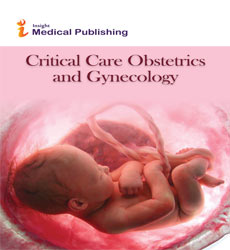Frontiers in Critical Obstetric and Gynaecologic Interventions
Victoria Snegovskikh
Department of Obstetrics, Gynecology and Reproductive Medicine, Nantes University Hospital, Nantes, France
Published Date: 2023-08-21DOI10.36648/2471-9803.9.3.125
Victoria Snegovskikh*
Department of Obstetrics, Nantes University Hospital, Nantes, France
- *Corresponding Author:
- Victoria Snegovskikh
Department of Obstetrics,
Nantes University Hospital, Nantes,
France,
E-mail: victoria@gmail.com
Received date: July 21, 2023, Manuscript No. IPCCO-23-17807; Editor assigned date: July 24, 2023, PreQC No. IPCCO-23-17807(PQ ); Reviewed date: August 07, 2023, QC No. IPCCO-23-17807; Revised date: August 14, 2023, Manuscript No. IPCCO-23-17807( R); Published date: August 21, 2023, DOI: 10.36648/2471-9803.9.4.125
Citation: Snegovskikh V (2023) Frontiers in Critical Obstetric and Gynaecologic Interventions. Crit Care Obst Gyne Vol.9.No.4:125.
Description
Obstetrics and Gynecology (OB/GYN) is a field of medicine that focuses on the care of women's reproductive health, including pregnancy, childbirth, and various gynecological conditions. Over the years, significant advancements have been made in critical obstetric and gynecologic interventions, both in terms of research and practical application. These advancements have not only improved maternal and fetal outcomes but have also paved the way for exploring new frontiers in medical science. In this article, we delve into some of the remarkable frontiers in critical obstetric and gynecologic interventions, highlighting the intersection of research and clinical practice. Maternal-fetal medicine is a specialized branch of obstetrics that focuses on managing high-risk pregnancies. With the advent of advanced imaging techniques and genetic testing, healthcare providers can now detect potential complications earlier in pregnancy. Prenatal screening and diagnosis have led to the development of targeted interventions for conditions such as preeclampsia, gestational diabetes, and fetal anomalies.
These interventions involve a multidisciplinary approach, including medical, surgical, and even minimally invasive procedures, to ensure the best possible outcomes for both the mother and the baby. Minimally invasive surgery has revolutionized the field of gynecology by offering less traumatic alternatives to traditional open surgeries. Techniques like laparoscopy and robotic-assisted surgery have significantly reduced patient discomfort, hospital stays, and recovery times. These approaches are increasingly being utilized for hysterectomies, myomectomies, and treatment of endometriosis. Research is ongoing to refine these procedures further and explore their applications in complex cases. Advancements in reproductive endocrinology have expanded options for women facing fertility challenges.
In vitro fertilization (IVF) and egg freezing have become standard practices, enabling women to preserve their fertility for medical or personal reasons. Emerging research focuses on improving the success rates of these techniques, refining embryo selection, and exploring innovative methods to enhance egg and sperm quality.
Stem Cell Therapy for Gynecologic Conditions
The era of personalized medicine has reached obstetrics and gynecology. Genetic and molecular studies allow healthcare providers to tailor treatments based on an individual's genetic makeup, reducing adverse reactions and optimizing outcomes. Pharmacogenomics, for instance, helps in selecting the most suitable medications for pregnant women while considering their genetic predispositions. Immunotherapy has shown promising results in the treatment of various cancers, including gynecologic malignancies like ovarian, cervical, and uterine cancers. Researchers are exploring the potential of immune checkpoint inhibitors and targeted therapies to boost the immune system's ability to recognize and eliminate cancer cells. These developments offer new hope for patients with advanced or recurrent gynecologic cancers. The digital revolution has not left OB/GYN untouched. Telemedicine has gained ground, allowing healthcare providers to offer consultations, monitor pregnancies, and provide postoperative care remotely. This is especially significant for women in remote or underserved areas. Additionally, mobile apps and wearable devices help women track their menstrual cycles, ovulation, and overall reproductive health, empowering them to make informed decisions about their bodies. Recognizing the psychological impact of obstetric and gynecologic conditions, there is growing emphasis on integrating mental health support into women's healthcare. Pregnancy-related mood disorders, postpartum depression, and the emotional challenges of infertility are being addressed through counseling, support groups, and even virtual platforms.
Psychological and Emotional Well-being
Integrating emotional well-being into treatment plans is now considered integral to comprehensive care. Artificial intelligence (AI) and data analytics are making inroads into OB/GYN research and practice. AI algorithms can analyze complex medical data, aiding in early diagnosis, risk prediction, and treatment optimization. Machine learning models can predict preterm birth risk, analyze ultrasound images, and even assist in predicting outcomes of IVF cycles. Stem cell therapy holds promise in regenerative medicine for gynecologic conditions. Research is exploring the potential of stem cells to treat conditions like urinary incontinence, pelvic organ prolapse, and even certain gynecologic cancers. These innovative approaches might offer alternatives to traditional surgical interventions. As medical interventions advance, ethical and legal considerations become crucial. Balancing patient autonomy, informed consent, and cultural sensitivities is paramount, especially in areas such as prenatal testing and fertility treatments. Clear guidelines and ethical frameworks are essential to ensure that these interventions are accessible, safe, and equitable. In conclusion,the field of critical obstetric and gynecologic interventions is witnessing remarkable progress at the intersection of research and practice. From cutting-edge surgical techniques to personalized medicine and innovative therapies, these frontiers are shaping the future of women's healthcare. As technology continues to evolve and researchers push boundaries, the potential to improve maternal and fetal outcomes while enhancing women's overall well-being is vast. However, it's important to tread carefully, considering both the medical and ethical dimensions of these interventions to ensure that they are used judiciously and responsibly.
Open Access Journals
- Aquaculture & Veterinary Science
- Chemistry & Chemical Sciences
- Clinical Sciences
- Engineering
- General Science
- Genetics & Molecular Biology
- Health Care & Nursing
- Immunology & Microbiology
- Materials Science
- Mathematics & Physics
- Medical Sciences
- Neurology & Psychiatry
- Oncology & Cancer Science
- Pharmaceutical Sciences
